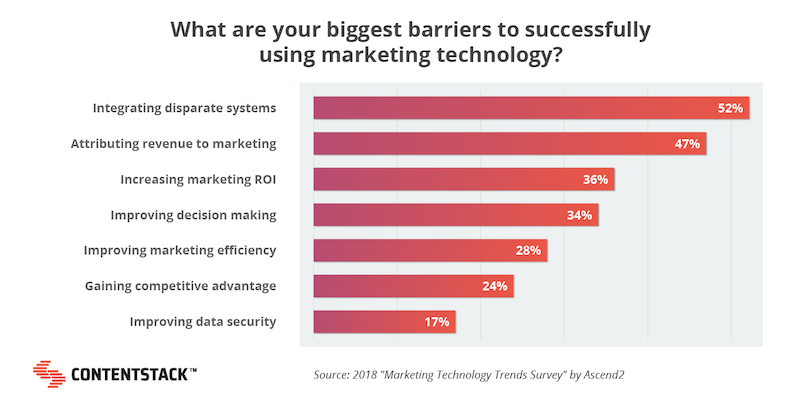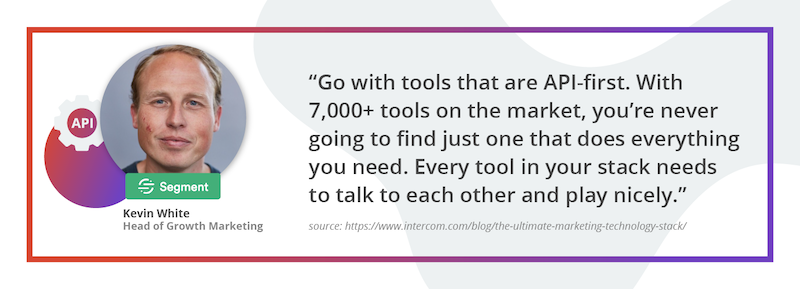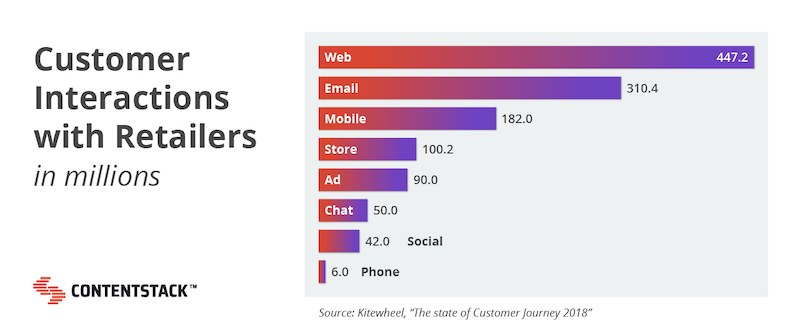3 Must-Have Digital Commerce Marketing Infrastructure Tools

Today, technology is developing so rapidly that even the savviest commerce marketing executives can easily find themselves falling behind when it comes to emerging trends and tools to evolve their strategies.
This article fills you in on some of the most impactful digital commerce marketing trends in 2020 and the technology to add to your infrastructure to stay in sync with consumers and competitors alike.
3 Critical Digital Commerce Marketing Infrastructure Trends and Tools to Adopt Today
A common thread runs through each of these critical digital commerce marketing infrastructure trends and tools: Connecting marketing efforts and processes to keep up with digital demands in 2020 and beyond.
The Trend: A Connected Digital Marketing Toolbox
Scott Brinker’s now-famous illustration of the marketing technology (martech) landscape has grown from including about 150 martech tools in 2011 to over 7,000 in 2019. And today’s typical enterprise company uses 60 different applications that most workers are switching between for up to an hour each day.
So it comes as no surprise that “integrating disparate tools” is one of the most prominent challenges marketers face when using technology effectively.

Getting the tools in your martech stack to play nicely together isn’t just a matter of convenience. It’s essential for your success that they can share data and function in a streamlined fashion so you can create and deliver personalized, omnichannel digital marketing at scale.
The Tool: APIs
Luckily for commerce marketers looking to connect their entire digital marketing strategy, APIs are the next big thing in software. An application programming interface (API) is software that lets a “product or service communicate with other products and services.” APIs offer a simplified way to connect technologies without understanding or having access to their inner workings.
To streamline your marketing strategy, look for martech applications with APIs. API support ensures they can integrate with each other and most other tools your business uses to streamline functionality in marketing and beyond.
No one marketing platform has all the features you need when you need them. Seamlessly piece together your platform, save on custom development costs, and maintain your flexibility with API-connected marketing software that can be infinitely changed and scaled.

The Trend: A Comprehensive, Informed Marketing Strategy
We’re mentioning a comprehensive view of data again because data is one of the most vital elements in commerce marketing today. In a world of 22 billion internet-connected devices and an industry with one of the most diverse channels mixes out there — if there’s anything commerce marketers have access to, it’s customer data.

However, having access to customer data doesn’t mean you have the knowledge, time, or capability to collect and apply it in a way that’s helpful to your marketing strategy. Luckily, there’s a tool for that.
The Tool: Customer Data Platform
A customer data platform (CDP) is a relatively new kind of software that “combines data from multiple tools to create a database of your customers.” As the central point of contact for customer data, CDP technology collects and organizes data into 360-degree customer profiles so that marketers can quickly create personalized campaigns.
CDP is gaining adoption rapidly because it’s among the first of its kind — a platform that consolidates business data in a way that’s helpful and accessible to marketers so they can create smart, comprehensive marketing strategies.
The Trend: Omnichannel Content and Product Delivery
One of the most prominent challenges commerce marketers experience when building a customer journey is the number of touchpoints. Yet, at the same time, the people who shop across multiple touchpoints are more valuable to brands: Spending up to 35% more during the average transaction and generating a 30% higher lifetime value than single-channel shoppers.
To generate the kind of experiences that omnichannel shoppers expect and pull in more significant profits for your business, you must keep your content fresh, accurate, and relevant on every channel where they interact with your brand.
The Tool: Headless Content Management
Whereas your traditional content management system (CMS) permanently connects content creation, storage, and distribution. A headless CMS replaces this permanent connection with APIs that make it optional.
With headless CMS, content exists separate from the way it’s distributed. It can be created and then re-formatted and re-distributed over and over again wherever it’s needed.
This functionality is critical to digital commerce marketing infrastructure because it empowers content professionals to focus on creating the most valuable business content. Using third-party applications that integrate into the headless CMS via API, marketers can plug in their CRM, email marketing programs, localization and translation tools, and even commerce solutions to customize content so that it’s just right for every audience and channel.
Headless CMS frees marketers from the rewrites, the copying and pasting, and the switching between different apps to tweak and publish different versions of the same content continually.
Keep Learning About Tools and Trends in the Digital Commerce Space
Digital commerce brands with a diligent commitment to ongoing learning are the ones that will stay ahead of the curve as the number of shoppers and consumption channels continues to rise at a rapid pace.
Check out some of our other content to keep educating yourself about tools and trends in digital commerce:
About Contentstack
The Contentstack team comprises highly skilled professionals specializing in product marketing, customer acquisition and retention, and digital marketing strategy. With extensive experience holding senior positions in notable technology companies across various sectors, they bring diverse backgrounds and deep industry knowledge to deliver impactful solutions.
Contentstack stands out in the composable DXP and Headless CMS markets with an impressive track record of 87 G2 user awards, 6 analyst recognitions, and 3 industry accolades, showcasing its robust market presence and user satisfaction.
Check out our case studies to see why industry-leading companies trust Contentstack.
Experience the power of Contentstack's award-winning platform by scheduling a demo, starting a free trial, or joining a small group demo today.
Follow Contentstack on Linkedin
Share on:





.jpg?format=pjpg&auto=webp)

